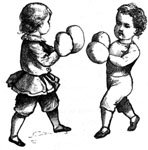
The Strange Magnetism of Virtual Fisticuffs
REVERT'S ROSTRUM
What happens when a fairly obscure writer for religious and conservative magazines and websites picks a fight with a Christian YouTube celebrity with over 200,000 followers? I can tell you from personal experience, and though the encounter was far less hostile than I anticipated, it confirmed suspicions I’ve had about social-media discourse and religious-celebrity culture.
This past Lent I came across an article about Lizzie Estella Reezay, a prominent YouTube personality who had announced her conversion from evangelical Protestantism to Catholicism. Intrigued, I watched some of her videos (her channel is called “LizziesAnswers”). Amid the emojis and general emotiveness, I perceived some errors and half-truths. Her followers seemed unaware of this, instead lauding her as the next great Catholic evangelist. So I wrote an article for a small religious webzine that was half critique, half admonition. Though I welcomed Lizzie into the Church, I was admittedly a little antagonistic, my language at times a bit harsh.
Weeks went by without any response. I shrugged my shoulders and moved on. Months later, a friend directed me back to Lizzie’s YouTube channel, where I discovered a new video she had posted devoted entirely to my article. She poked fun at it, even performing a “dramatic reading” of excerpts. Though she accused me of misrepresenting her and taking her out of context, she also praised my writing and acknowledged that some of my cautions and concerns were legitimate. She promised to make changes to her channel. Whatever minor mockery she made of me and my article, I considered this a “win.”
But I was disconcerted by the hundreds of comments her fans had posted to her video. Some accused me of jealousy, self-righteousness, judgmentalism, and being “butt hurt” — whatever that means. Others called my article ugly, unwelcoming, and offensive. And despite Lizzie’s praise of my writing, some derided my other work as obnoxious. More perplexing were the many commenters who urged their heroine to ignore “attacks” from young Protestant “know-it-alls” with little life experience. (News flash: I’m a Catholic, and I have some life experience as a husband, father of three, and Afghan War veteran.) This Internet chatter underscores my first apprehension: Social media often fails to facilitate civilized discourse and too easily traffics in misrepresentations of information.
You May Also Enjoy
Since the apostolic age, the Church’s growth has been accompanied by an incredible diversity of miracles.
The West's turning away from Faith and the sacraments has opened a void we now try to fill with whatever hucksters come up with next.
John Senior was a noble man who stood against the spirit of the age to remind the world of a better time, and he left those he touched better for his presence.

